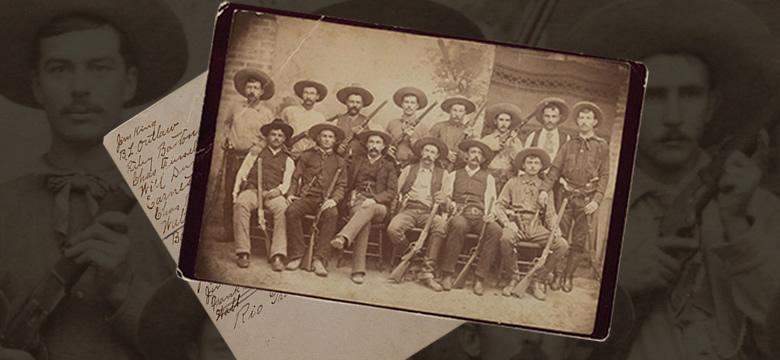I’m a native Texan through and through. I was born and raised in the Dallas-Fort Worth area, I went to school here, and now I’m raising my children here. Growing up in Texas, it’s hard not to be inundated with tales of the Old West. Westerns were a mainstay in my house growing up.
I devoured the works of Louis L’Amour and Zane Grey. Saturday and Sunday afternoons found me glued to the television watching old episodes of The Lone Ranger, The Rifleman, Alias Smith and Jones, Rawhide. When I was very young, I proudly wore my (plastic) six shooter and Lone Ranger mask. But nothing fascinated me more than tales of the Texas Rangers. First let me provide a little background on the Rangers.
The story begins some two years after Anglos from the United States began colonizing Mexican Texas, around 1823. Stephen F. Austin, the namesake of the state’s capital, hired ten men to function as rangers against marauding Indians, but it was not until the Texas Revolution (specifically on November 24, 1835) that an actual force was established bearing the name Texas Rangers. They fought in the Texas Revolution, the Mexican War, the Civil War, and even the Mexican Revolution during the early years of the twentieth century. Rangers protected the frontier from all manner of dangers. An interesting side note, in the early days they also functioned as land surveyors while out in the field. Men such as John Coffee “Jack” Hays, Samuel Walker, William A.A. “Bigfoot” Wallace, and John Salmon “RIP” Ford became legends.
In the decade following the Civil War, Texas was plagued with attacks by the Comanche and Kiowa, bandidos from Mexico bent on thievery, and general misbehavior by outlaws such as Sam Bass and the notorious John Wesley Hardin. In 1874, the Texas Legislature reorganized the Rangers into six companies known as the Frontier Battalion. By the late 1880s, the Battalion was reduced to only three companies – B, D, and F. This provides a nice segue into the purpose of this blog entry.
At this Saturday’s (June 14, 2014) Legends of the West sale, we are offering an 1888 photograph of the men of Company D. Included in the photograph is one J. Walter Durbin, one of the more famous Frontier Battalion-era Rangers.
I should probably provide a little background info on the photograph itself. It was taken in Rio Grande City, Texas (located on the Mexican border about 40 miles from McAllen), in November 1888. Several famous faces accompany Durbin including his brother, Tink Durbin, Capt. Frank Jones, Bass Outlaw (who was killed six years later in a gunfight where he murdered fellow Ranger Joe McKidrict in a drunken stupor), Cal Aten, and Frank Schmid (who sustained a fatal gunshot wound the year after this picture was taken, though he lingered on another four years). Each of the men is identified on the reverse.
What is unique about this photograph (aside from its marvelous condition) is the history behind it. This cabinet card has been passed down from Walter Durbin through four generations to his great-granddaughter. I caught up with her and she was kind enough to provide some family history with me, a portion of which I will share with y’all:
How did the photograph come to be in your possession? “When I was fifteen or sixteen, I was still living at home, taking care of my grandmother after school each day. She was very interested in talking about when she grew up in Texas. . . . She left all of her pictures to my mom and me.”
Can you recall any stories or family legends your mother or grandmother told you regarding Durbin? “My grandmother Julia said he was always nicely groomed and had southern manners; very polite to people. He had a quiet sense of humor and would sometimes tell young kids wild stories about his cowboy and Ranger days. He preferred to arrest whoever if he could, instead of having to shoot them, a last resort only she told me. He treated his prisoners out on the prairie fairly well, fed them on the way to taking them to jail.”
What about his wife? “His wife, Mollie, could ride and shoot as well as any man.”
He sounds like a fascinating man. He had a brother, Tink, who was also a Ranger and is featured in the photograph. Any other siblings? “Walter Durbin had two brothers . . . they all had a good religious background growing up. He also had one sister, May, who later moved to San Francisco. Elisha [one of the brothers] was a deputy sheriff and owned a printing office for the Denton County News, a serious and very quiet, good man, everyone said. . . . His youngest brother, Will “Tink” Durbin was a Texas Ranger also in Co. ‘D’ and deputy sheriff in Denton County. Later he returned to operate a saloon in Denton and Lewisville.”
What did Durbin do after he left the Rangers? “While a sheriff in Pearsall, Walter also owned a saloon and billiard hall. As a young man he worked on farms, was good at carpentry, and later became a Texas Ranger. He . . . had three children: Julia (my grandmother), Marshall, and Herman. Durbin kept detailed accounts of his times with the Rangers. He loved poetry and loved to read. In 1916, at age 56, he passed away after suffering from a very bad case of poison oak.”
By Bryan Booher
